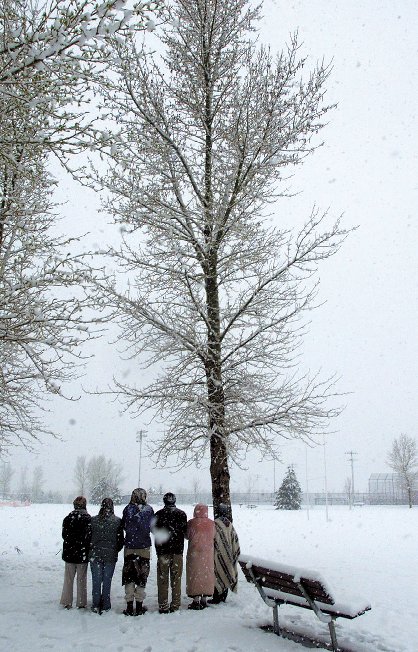When it comes to events like school shooting in Newtown, Conn., there are knowns, unknowns and, already, mis-knowns. A photograph of Ryan Lanza circulated asserting he was the shooter, when in fact it was his brother, Adam Lanza.
Their mother, Nancy Lanza, whom Adam killed, was reported to have been a teacher at Sandy Hook Elementary, where the other shootings took place ― but she was not. The story of what happened Friday when 20 children and seven adults were killed has been written and rewritten, and it probably will be rewritten again.
Much can be learned from journalist Dave Cullen’s illuminating 2009 book “Columbine,” a deeply researched history of the 1999 Colorado shootings that proved much of what we thought we knew about them was wrong.

When two teenagers at Columbine High School killed 12 other students, a teacher and themselves, Cullen was among the first wave of reporters who rushed there to begin telling the story. “I ran with the journalistic pack that created the myths we are still living with,” he wrote in an op-ed this summer after shootings at a Colorado movie theater left 12 dead. “We created those myths for one reason: We were trying to answer the burning question of why, and we were trying to answer it way too soon.”
In “Columbine,” Cullen admitted, “I was among the guilty parties.” The narrative that was created in the moment was nearly indelible, yet not entirely correct. Cullen spent nine years researching the story of the survivors and the killers; David L. Ulin reviewed the book for the Los Angeles Times in 2009.
“Forget everything you thought you knew,” Ulin wrote. “The girl who professed her faith in God before being gunned down in the library. The Trenchcoat Mafia and the feud between the goths and jocks. The idea that Eric Harris and Dylan Klebold ― the two Columbine High School seniors who, on April 20, 1999, killed 12 of their fellow students and one teacher in what was, at the time, the worst school shooting in the history of the United States ― were disaffected, unpopular, motivated by resentment or revenge. Even the fact that the killings took place on Adolf Hitler’s birthday was a coincidence: The boys had planned to do it a day earlier but hadn’t been able to get the ammunition in time.
“All of this, Dave Cullen notes in ‘Columbine,’ his comprehensive account of the tragedy and its aftermath, is the story we’ve been given, the mythic version, the one that (if anything can) aspires to make a kind of sense. It’s a rendering in which the pieces fit together and the terror of the day is mitigated by small moments of redemption, whispers of epiphany and grace.
“The problem, however, is that none of it happened ― or more accurately, none of it happened exactly like that. Instead, Cullen points out, the Columbine story was obscured from the outset: first, by the misperceptions of the witnesses, and then, almost immediately, by the misreporting of the media, which at its worst resembled nothing so much as an enormous game of telephone. ‘The Columbine situation played out slowly,’ Cullen writes, ‘with the cameras rolling. Or at least it appeared that way: the cameras offered the illusion we were witnessing the event. But the cameras arrived too late. ... We saw fragments. What the cameras showed us was misleading. ... The data was correct; the conclusions were wrong.’”
Cullen’s book was a finalist for the L.A. Times Book Prize, won the Edgar Award for nonfiction, made bestseller lists and racked up a string of other accolades. “Indeed, if Cullen’s book offers any overarching lesson,” Ulin wrote, “it’s that some stories can only be demystified by taking the long view ― especially a story as troublesome and complicated as this.”
Following the Newtown tragedy, Cullen’s perspective has been much in demand. He was on “The Rachel Maddow Show” on Friday and appeared on Katie Couric’s show Monday.
By Carolyn Kellogg
(Los Angeles Times)
(MCT Information Services)





![[Exclusive] Hyundai Mobis eyes closer ties with BYD](http://res.heraldm.com/phpwas/restmb_idxmake.php?idx=644&simg=/content/image/2024/11/25/20241125050044_0.jpg)
![[Herald Review] 'Gangnam B-Side' combines social realism with masterful suspense, performance](http://res.heraldm.com/phpwas/restmb_idxmake.php?idx=644&simg=/content/image/2024/11/25/20241125050072_0.jpg)

